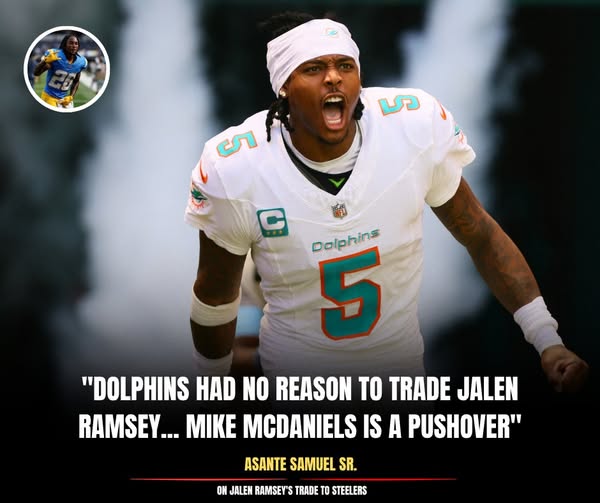Former NFL cornerback Asante Samuel Sr. is never one to shy away from speaking his mind, and his latest comments about Miami Dolphins head coach Mike McDaniel have stirred up controversy. Following the trade that sent star cornerback Jalen Ramsey to the Los Angeles Rams, Samuel didn’t hold back, labeling McDaniel a “pushover” and questioning the leadership within the Dolphins organization. His fiery remarks have sparked debate among fans and analysts, raising questions about whether Miami got the short end of the deal and if McDaniel’s approach is too passive in high-stakes negotiations.
Known for his outspoken nature, Samuel took to social media to voice his displeasure with the Ramsey trade, which saw Miami send the All-Pro cornerback back to the Rams in exchange for a 2025 third-round pick and tight end Hunter Long. Samuel didn’t mince words, calling the deal “weak” and suggesting that McDaniel was outmaneuvered in negotiations.
*“Mike McDaniel is a pushover. How you let them take Ramsey from you for scraps?”* Samuel posted. *“Dolphins got played. That’s why you can’t have a soft coach making these decisions.”*
His comments immediately went viral, with many debating whether Samuel’s assessment was fair or just another example of his unfiltered takes. Some fans agreed, arguing that Miami should have demanded more in return for a player of Ramsey’s caliber, while others defended McDaniel, pointing out that salary cap constraints and Ramsey’s injury history played a role in the trade’s structure.
The trade itself raised eyebrows across the league. Ramsey, a six-time Pro Bowler and three-time First-Team All-Pro, was expected to be a cornerstone of Miami’s defense when he was acquired from the Rams in 2023. However, injuries limited his impact, and with the Dolphins facing cap issues, moving his hefty contract became a priority.
While the return—a third-round pick and a backup tight end—seemed underwhelming, Miami’s front office likely viewed it as a necessary move to free up financial flexibility. Still, Samuel’s criticism centers on the idea that the Dolphins should have held out for better compensation, especially given Ramsey’s pedigree when healthy.
*“You telling me no other team would’ve given up at least a second-rounder for Ramsey?”* Samuel continued. *“That’s bad business. McDaniel got outplayed.”*
Samuel’s comments go beyond just the trade itself—they attack McDaniel’s perceived demeanor as a head coach. Known for his analytical, player-friendly approach, McDaniel has been praised for his offensive ingenuity but has also faced questions about whether he’s tough enough to navigate the cutthroat aspects of NFL management.
Critics, like Samuel, argue that McDaniel’s lack of an aggressive, hard-nosed mentality makes him an easy target in negotiations. *“You think Belichick or Andy Reid would’ve let Ramsey go for that? Nah,”* Samuel said, comparing McDaniel to some of the league’s most respected coaches.
Supporters of McDaniel, however, counter that his collaborative style is what makes him effective. They point to Miami’s offensive success under his guidance and argue that general manager Chris Grier, not McDaniel, is primarily responsible for trade decisions. Still, Samuel’s remarks have reignited the debate over whether McDaniel needs to adopt a more assertive persona when it comes to personnel moves.
Beyond the immediate fallout from Samuel’s comments, the Ramsey trade raises bigger questions about Miami’s direction. The Dolphins are in a win-now window with quarterback Tua Tagovailoa entering his prime, and losing a player of Ramsey’s stature weakens their defense. If Samuel’s criticism holds weight, it could signal deeper issues in how the organization handles high-profile transactions.
Additionally, Samuel’s remarks may resonate with players around the league. If Miami is viewed as a team that folds in negotiations, it could impact future free-agent signings or trade discussions. The NFL is a league where perception often influences reality, and the Dolphins can’t afford to be seen as a soft target in deals.
So far, neither McDaniel nor the Dolphins have publicly responded to Samuel’s comments. However, it’s unlikely that the organization will engage in a war of words with a retired player. Instead, the focus will be on how Miami rebounds from the trade and whether they can adequately replace Ramsey’s production.
If the Dolphins struggle defensively in 2024, Samuel’s criticism will gain more traction. But if Miami’s defense holds strong and the freed-up cap space leads to impactful signings, McDaniel and the front office will have the last laugh.
Asante Samuel Sr. has never been afraid to ruffle feathers, and his latest take is no exception. While some may dismiss his comments as mere trolling, there’s a legitimate discussion to be had about whether the Dolphins could have extracted more value for Ramsey.
At the same time, NFL trades are complex, and factors like salary cap constraints, player health, and team needs all play a role. McDaniel’s leadership style may not be as confrontational as Samuel would prefer, but that doesn’t necessarily mean he’s a “pushover.”
One thing is certain: Samuel’s words have added fuel to an already heated debate. If the Dolphins falter this season, his criticism will echo louder. But if Miami thrives, McDaniel will have proven that success in the NFL doesn’t always require a hard-edged approach. Either way, this story is far from over.



